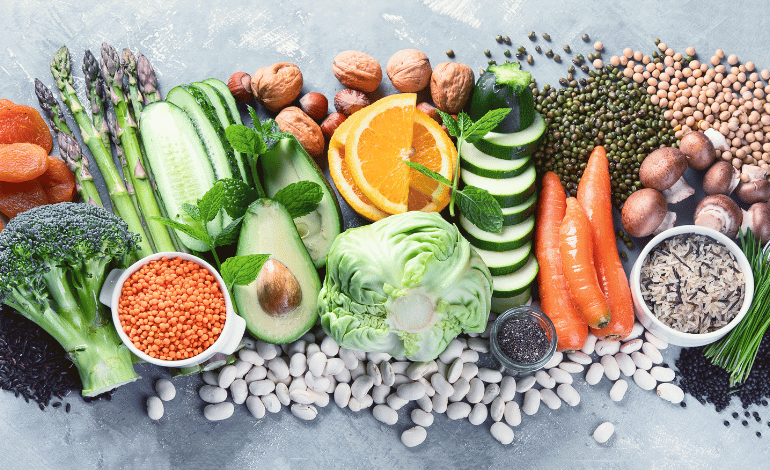Keto diet for Weight Loss: Benefits and Drawbacks

Introduction
Keto diet for Weight Loss: Benefits and Drawbacks: The ketogenic diet, also known as the keto diet, is a high-fat, moderate-protein, and low-carbohydrate diet. The goal of this diet is to get your body into a state of ketosis, where it starts burning fat for fuel instead of glucose.
The typical macronutrient breakdown of a ketogenic diet is 70-75% fat, 20-25% protein, and 5-10% carbohydrates. This means that you will be consuming foods that are high in healthy fats, such as avocados, nuts, seeds, coconut oil, and fatty fish, as well as moderate amounts of protein, such as meat, poultry, and eggs.
Carbohydrates, on the other hand, should be limited to around 20-50 grams per day. This means that you will need to avoid most grains, fruits, and starchy vegetables, and instead focus on low-carb options like leafy greens, cruciferous vegetables, and berries.
However, there are also some potential drawbacks to the keto diet. In this article, we will explore the benefits and drawbacks of the keto diet for weight loss.
What You Can Eat for Keto Diet
The Keto Diet includes a variety of foods that are high in healthy fats and low in carbohydrates. Here are some examples of foods that are commonly included in the Keto Diet:
Fats and Oils: Olive oil, coconut oil, avocado oil, butter, ghee, and other healthy oils and fats.
Proteins: Meat, poultry, fish, eggs, and tofu.
Non-starchy vegetables: Leafy greens, cauliflower, broccoli, zucchini, asparagus, and peppers.
Nuts and Seeds: Almonds, macadamia nuts, walnuts, and chia seeds.
Dairy: Cheese, heavy cream, and high-fat yogurt.
Berries: Blackberries, raspberries, and strawberries, in limited amounts.
Beverages: Water, coffee, tea, and unsweetened almond milk or coconut milk.
It’s important to note that the Keto Diet is highly individualized, and the specific foods you eat may vary depending on your personal preferences and dietary restrictions. It’s also important to choose high-quality, nutrient-dense foods that provide a variety of vitamins, minerals, and antioxidants to support overall health.
Benefits of Keto Diet
The primary goal of the keto diet is to force your body to enter a metabolic state called ketosis, where it burns fat for energy instead of carbohydrates. This can lead to rapid weight loss and decreased appetite. Additionally, the keto diet has been shown to improve blood sugar control and reduce the risk of certain chronic diseases, such as diabetes and heart disease.
The keto diet is also a great way to reduce inflammation in the body. Many people who suffer from chronic conditions like arthritis, migraines, or skin conditions have reported improvements in their symptoms after starting a ketogenic diet. Some studies also suggest that the keto diet may be beneficial for improving cognitive function, such as memory and concentration. So here are some benefits of the Keto diet:
Weight Loss: One of the primary benefits of the ketogenic diet is weight loss. By drastically reducing carbohydrate intake and increasing healthy fat intake, the body enters a state of ketosis, where it burns fat for fuel instead of glucose. This leads to more efficient fat burning and can result in weight loss.
Improved Insulin Sensitivity: The ketogenic diet has been shown to improve insulin sensitivity, which is important for maintaining healthy blood sugar levels. Improved insulin sensitivity can also reduce the risk of developing type 2 diabetes.
Reduced Inflammation: Inflammation is a contributing factor to many chronic diseases, including heart disease, cancer, and Alzheimer’s disease. The ketogenic diet has been shown to reduce inflammation in the body, which can help prevent these diseases.
Lowered Blood Sugar Levels: The ketogenic diet can lead to lower blood sugar levels, which is important for individuals with type 2 diabetes. By reducing carbohydrate intake, the body requires less insulin to process glucose, which can result in lower blood sugar levels.
Improved Brain Function: The brain relies heavily on glucose for fuel, but it can also use ketones for energy. The ketogenic diet has been shown to improve cognitive function and memory in individuals with Alzheimer’s disease and epilepsy.
Increased Energy Levels: Many people report increased energy levels on the ketogenic diet, as the body is better able to utilize fat for fuel. This can also lead to better endurance and improved athletic performance.
Reduced Risk of Certain Diseases: The ketogenic diet has been shown to reduce the risk of certain diseases, including heart disease, cancer, and neurological disorders. It can also help improve cholesterol levels and reduce the risk of stroke.
Appetite Suppression: The high-fat content of the ketogenic diet can help suppress appetite, leading to fewer cravings and overall reduced calorie intake.
Improved Skin Health: The ketogenic diet has been shown to improve skin health, reducing acne and improving overall complexion.
Reduced Risk of Seizures: The ketogenic diet was originally developed as a treatment for epilepsy, and it is still used today as a treatment for individuals with seizures that do not respond to medication.
Overall, the ketogenic diet has numerous potential health benefits. However, it is important to work with a healthcare professional before starting the diet, especially if you have any underlying health conditions. Additionally, the diet can be difficult to follow and may require significant changes in lifestyle and eating habits.
Drawbacks of Keto Diet
There are some potential drawbacks of the Keto Diet:
Difficulty sticking to the diet: The Keto Diet requires a significant reduction in carbohydrates and an increase in fats. This can be challenging for some people to maintain in the long term, especially those who have a hard time avoiding carb-heavy foods. It may also be difficult for people who travel frequently or have a busy lifestyle to stick to the diet.
Potential nutrient deficiencies: The Keto Diet restricts certain foods, including fruits, grains, and legumes, which are sources of important vitamins, minerals, and fiber. If you don’t carefully plan your meals, you may be at risk for nutrient deficiencies.
Keto flu: When you first start the Keto Diet, you may experience symptoms such as fatigue, headaches, and irritability, which are collectively referred to as the “Keto flu.” These symptoms usually go away after a few days, but they can be uncomfortable.
Increased risk of heart disease: The Keto Diet is high in saturated fats, which can increase your risk of heart disease if consumed in excess. It’s important to choose healthy sources of fats, such as avocados, nuts, and olive oil, and to limit your intake of processed meats and fried foods.
Difficult to maintain a social life: The Keto Diet may make it challenging to eat out with friends or attend social gatherings where carb-heavy foods are often served. This can make it difficult to maintain a social life while on the diet.
It’s worth noting that the Keto Diet can be effective for weight loss and may have some health benefits for certain individuals. However, it’s important to speak with a healthcare professional before starting any new diet.
Is Keto Diet Suitable for Everyone?
The Keto Diet may not be suitable for everyone, as it involves a significant reduction in carbohydrates and an increase in fats. While the diet may be beneficial for some individuals, it’s important to consider several factors before starting the Keto Diet.
Firstly, if you have a medical condition such as diabetes, high blood pressure, or kidney disease, it’s essential to speak with your healthcare provider before starting the Keto Diet. The diet can cause changes in blood sugar levels and electrolyte imbalances, which may require monitoring and adjustment of medication dosages.
Additionally, pregnant or breastfeeding women should avoid the Keto Diet, as it may not provide sufficient nutrients for both the mother and baby. The diet can also cause a significant reduction in milk supply for breastfeeding mothers.
People with a history of disordered eating or those who are prone to developing unhealthy relationships with food may find the restrictive nature of the Keto Diet challenging and may be at risk for developing further disordered eating patterns.
Lastly, the Keto Diet may not be suitable for athletes or individuals who engage in high-intensity exercise, as the diet can cause a reduction in glycogen stores, which are the body’s primary source of fuel during exercise. This can lead to decreased performance and fatigue during workouts.
In summary, while the Keto Diet may be suitable for some individuals, it’s essential to speak with a healthcare provider before starting the diet, particularly if you have a medical condition or are pregnant or breastfeeding. It’s also important to consider your lifestyle, activity level, and relationship with food before starting the Keto Diet.
Conclusion
While the keto diet has several potential benefits for weight loss and overall health, it is important to approach it with caution and informed guidance from a healthcare professional. The decision to try the keto diet should be based on individual goals, preferences, and health status. Ultimately, a balanced, sustainable approach to nutrition and lifestyle habits is crucial for long-term health and wellness.
Keto diet: The benefits and drawbacks of a low-carb, high-fat diet for weight loss
45 Keto Dinner Recipes That Are Simple And Guilt Free
FAQS
Q1. What is the Keto Diet?
Ans. The Keto Diet is a low-carbohydrate, high-fat diet that aims to put your body in a state of ketosis, where it burns fat for energy instead of glucose.
Q2. What foods can I eat on the Keto Diet?
Ans. You can eat foods that are high in healthy fats, such as avocados, nuts, and olive oil, along with moderate amounts of protein and low-carbohydrate vegetables such as leafy greens, broccoli, and cauliflower. You should avoid or limit foods that are high in carbohydrates, such as grains, sugar, and fruits.
Q3. How long does it take to enter ketosis?
Ans. It typically takes 2-4 days to enter ketosis, but it can take longer for some people.
Q4. Can I eat carbs on the Keto Diet?
Ans. Carbohydrate intake is typically limited to 20-50 grams per day on the Keto Diet, so it’s essential to choose carbohydrates that are nutrient-dense and fit within your daily carb allowance.
Q5. Is the Keto Diet safe?
Ans. The Keto Diet can be safe for most healthy individuals, but it’s important to speak with a healthcare provider before starting the diet, particularly if you have a medical condition or are pregnant or breastfeeding.
Q6. Can the Keto Diet help with weight loss?
Ans. Yes, the Keto Diet can be effective for weight loss, as it promotes fat loss by putting the body in a state of ketosis.
Q7. Are there any side effects of the Keto Diet?
Ans. Some common side effects of the Keto Diet include the “Keto flu,” which includes symptoms such as fatigue, headaches, and irritability. It can also cause constipation, bad breath, and a temporary increase in cholesterol levels.
Q8. Can I exercise on the Keto Diet?
Ans. Yes, you can exercise on the Keto Diet, but it’s important to note that the diet may cause a temporary decrease in exercise performance until the body adjusts to using fat as fuel.








